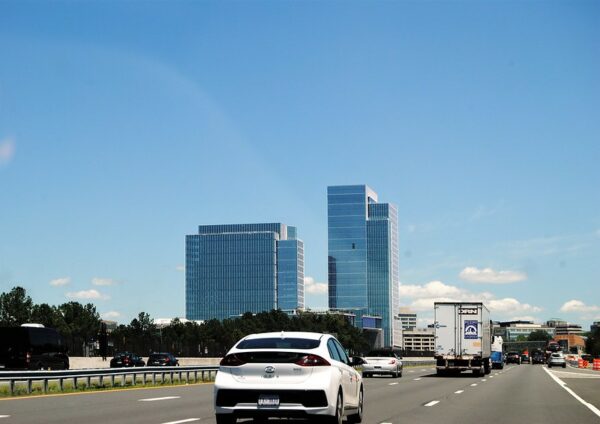
Virginia is reconsidering the future of funding for transportation infrastructure, as the rise of electric and more fuel-efficient vehicles has cut into the gas tax revenue that helps pay for those projects.
One option the Commonwealth has started pursuing is a “mileage-based user fee” that drivers would pay depending on how much or little they travel. Drivers could opt into the voluntary system in lieu of paying a mandatory highway user fee that first took effect on July 1, 2020.
State Sen. Janet Howell (D-32nd District) says the highway use fee — which applies to cars that average at least 25 miles per gallon and is calculated based on the fuels tax at the time of a vehicle’s registration and the average number of miles it travels in the state — is a precursor to Virginia’s planned mileage-based user fee program.
“For most of the past decade, Virginia, like the rest of the country, has been wrestling with the challenge of identifying the best approach to generating sufficient revenues to support transportation investments,” she said in a statement. “As cars have become more fuel efficient and electric vehicle adoption increases, it is increasingly difficult to strike the right balance of raising adequate revenues from traditional sources and adhering to a usage-based philosophy of highway financing.”
The Virginia Department of Motor Vehicles is currently fielding requests from private contractors to operate the program, which it anticipates rolling out in July 2022. Led by the DMV, a workgroup tasked with developing the program is slated to deliver an interim report to the Commonwealth this December.
The working group is identifying all requirements to Virginia’s mileage-based user fee program with “a priority on consumer privacy protection and equity,” DMV spokesperson Jessica Cowardin said in a statement.
Seeking new ways to fund road repairs and transit projects, Virginia established the mileage-based fee program in April 2020 when the General Assembly adopted a major transportation bill that also established the highway use fee and raised gas taxes for the first time in more than three decades.
The bill also lowered vehicle registration fees by $10 and repealed an annual $64 fee for electric and alternative fuel vehicles.
The changes, which include tying the gas tax rate to the Consumer Price Index to keep up with inflation starting next year, will help Virginia diversify its funding sources to offset stagnant or declining gas tax revenue, state legislators say.
The consultant KPMG previously estimated that Virginia would lose nearly 33% of its gas tax revenues by 2030 due to fuel efficiency, or approximately $260 million.
“Neither the [Highway Use Fee] nor the EV Registration fee are intended to suppress the sales of fuel efficient or electric vehicles, but simply recapture the average annual revenue from the foregone gas taxes,” Howell said.
The idea of taxing drivers based on how much they travel instead of the fuel they use has been gaining traction throughout the U.S. over the past decade.
Despite inflation, the federal gas tax rate has been locked in at 18.4 cents per gallon since it went up from 14.1 cents in 1993, meaning there’s less money to fund highway improvements.
“Many cars are not using gas at all, such as electric, so that system of highway finance has been coming apart for a long time,” said Jonathan Gifford, director of George Mason University’s Center for Transportation Public-Private Partnership Policy in Arlington.
If Virginia wants to encourage a transition to clean energy and electric vehicles, which “is absolutely essential to addressing climate change, we will need to look to other options” to pay for transportation projects, Northern Virginia Transportation Alliance President Jason Stanford says.
Oregon launched a road usage charge program in the mid-2000s that collects 1.8 cents per mile driven by participants for its State Highway Fund. Utah also has a program where electric and hybrid vehicle users can pay fees based on their road usage instead of a flat alternative fuel vehicle fee instituted in 2018.
Virginia’s program will be modeled off of the approaches adopted by those states.
“A vehicle-miles-traveled or mileage-based user fee approach ultimately makes a lot of sense,” Stanford said. “A lot of people envision that it would take the place of the gas tax.”
Relevant to Fairfax County and the rest of Northern Virginia, a large-scale study of how mileage-based fees might work in conjunction with toll lanes is now underway.
Launched on June 29, the DriveTU pilot program is being conducted by Transurban, the company that operates the I-95, 395, and 495 express lanes, in partnership with the Eastern Transportation Coalition, which represents 17 East Coast states, including Virginia, and D.C.
According to a press release from Transurban, the study is being funded by the U.S. Department of Transportation, and the company is currently looking to recruit 400 participants for the three-month pilot.
“Our research has shown that a mileage-based user fee approach is viable, and that drivers are open to a ‘user pays’ approach to transportation funding,” Eastern Transportation Coalition Executive Director Dr. Patricia Hendren said in the release.
In addition to seeing how people respond to the idea of paying a mileage-based user fee, the study will look at the technology that could be used to calculate the fees, from odometer readings to GPS-linked devices that track a car’s mileage.
Surveys suggest there could be some hurdles to getting the general public to accept a mileage-based fee system, including skepticism of its fairness and privacy concerns.
To address the latter, a paper from the RAND Corporation, a nonprofit think tank, suggested making a third party responsible for the mileage data or having multiple vendors offer metering devices to give customers a choice.
“There are sort of workarounds where you plug a device into the data port of your car,” Gifford said. “And that keeps track of the miles and the time of use but doesn’t specifically beam out information about where you are.”
Photo via vantagehill/Flickr





